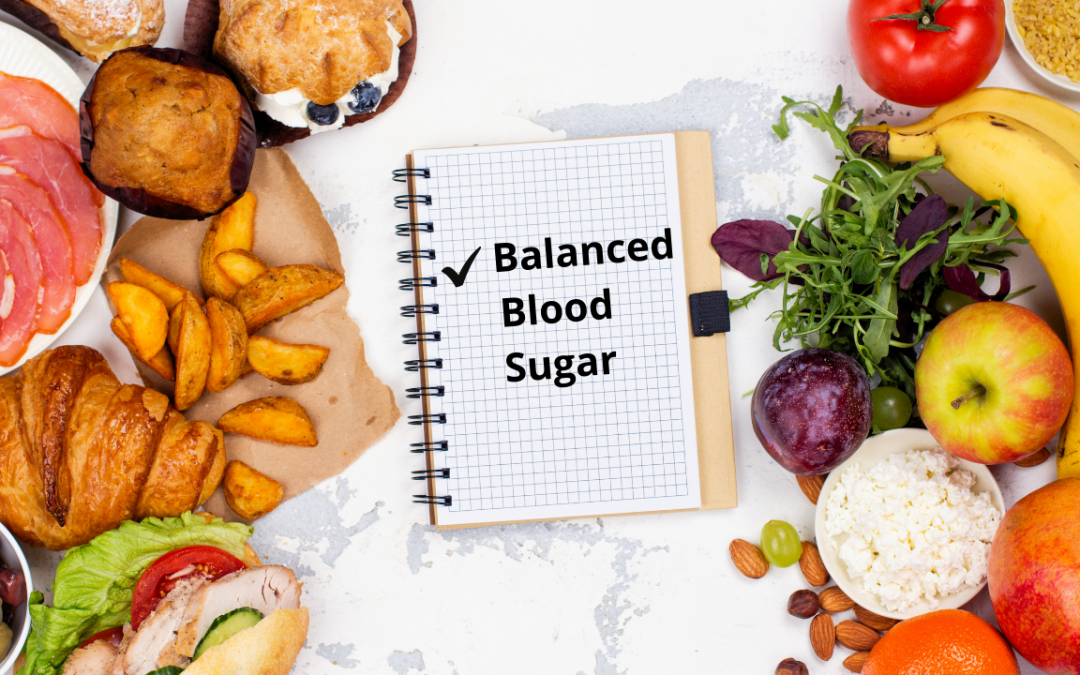Our dietary choices and lifestyle practices play a huge role in either maintaining balance or spiking blood sugar levels. The number of people with pre-diabetes and type 2 diabetes is also rising rapidly in North America and it is something I see in my practice more often than I’d like!
How Does Blood Sugar Fluctuate?
Carbohydrates we eat are broken down by the body into sugar, or glucose. This sugar is then absorbed into the bloodstream (blood sugar) to be used for energy. This process is regulated by the hormone insulin, which is released by the pancreas. Any excess blood sugar unused by the body for energy is stored in your liver.
It is all smoothly orchestrated so that you have energy when you need it – as long as your insulin levels are properly balanced! But what if they’re not? That is when we encounter blood sugar dysregulation and diabetes.
Signs Your Body is Crying for Help
A blood sugar imbalance can result in a list of symptoms that are often easy to blame on stress or aging. These include:
Excess belly fat: When your body senses high glucose levels, it secretes more insulin to trigger your cells to absorb the excess glucose. Insulin also encourages fat storage, especially around the belly. Unfortunately, this can create a vicious cycle, since belly fat increases insulin resistance, so your pancreas then responds by releasing even more insulin.
Mood changes: Do you regularly “crash” after a carb-heavy meal? Or do you feel shaky, irritable, or “hangry” when you haven’t eaten in a while? Mood swings, including bursts of manic energy followed by rapidly depleted energy, are often in response to fluctuations in blood sugar and a diet that is rapidly spiking blood sugar.
Cravings: Another frustrating irony is that excess blood sugar leads to cravings for more carb-heavy and sugary foods, further adding to the cycle of insulin production. This tells us that not only are blood sugar levels imbalanced but there may be an underlying gut issue as well.
Difficulty concentrating: Without the energy supplied by glucose, your brain cells do not function optimally. As a result, concentration and focus suffer – but eating something that causes glucose levels to spike is not the solution, since you’ll be headed for a crash.
Thyroid trouble: The link between insulin and thyroid health is complex. Excess insulin can harm the thyroid. At the same time, a healthy thyroid helps control insulin.
Female hormone imbalance: Healthy female hormones depend upon balanced blood sugar. In short, excess insulin produces increased amounts of testosterone, and belly fat tissue converts excess testosterone into estrogen. This produces increased estrogen in the body which results in too little progesterone. Since progesterone is a calming hormone, too little of it means women often experience symptoms of anxiety, depression, insomnia, fertility issues, and more.
Type 1 and Type 2 Diabetes
People with diabetes experience problems with the production of insulin and the subsequent rise in their blood sugar.
Type 1 diabetes is an auto-immune condition that prevents the pancreas from producing adequate amounts of insulin, resulting in low blood sugar levels which need to be monitored closely.
Type 2 diabetes is considered to be a “lifestyle disease”. After several years of imbalanced blood sugar levels, the body develops insulin resistance where cells do not respond well to the insulin being released.
How to Manage Your Blood Sugar Levels for Optimal Health
As mentioned, blood sugar dysregulation and type 2 diabetes are very much lifestyle diseases, and certain lifestyle factors can greatly impact how well your body manages blood sugar levels. Here are my top tips for managing blood sugar for optimal health.
Avoid Spiking Blood Sugar with a Balanced Diet
The most important step for stabilizing blood sugar is to avoid food and eating patterns that can lead to a sudden spike in blood sugar. Different types of carbohydrates are digested and absorbed at different rates, based on several factors, including fat and fiber content, and the type of sugar the food contains.
Fiber slows the absorption of glucose, so including foods with high fiber content with meals helps stabilize blood sugar. Soluble fiber, which is found in foods like oats, citrus, and many berries, is the most effective. Similarly, including protein with each meal helps slow down blood sugar spikes.
The glycemic index (GI) was developed to measure food’s impact on blood sugar. The higher the food is found on the index the faster it spikes blood sugar, while the foods found on the lower end of the glycemic index are more slowly digested and absorbed. Note that the glycemic index only applies to foods that contain carbohydrates.
Several studies have found that following a low glycemic diet can reduce the risk of developing type 2 diabetes.
Following a low glycemic diet does not have to be difficult. Along with including fiber and protein in each meal, it’s simply a matter of swapping a high-GI food for a lower-GI choice.
Be Mindful of Your Beverages
The drinks we consume have a big impact on blood sugar. That is because drinks are easily digested, resulting in a quick shot of glucose. One study found that people who drink at least one sweet drink a day have a 26 percent higher chance of developing diabetes!
Choosing an alternative is not always straightforward, however. Be careful with artificially sweetened drinks, as studies have linked some artificial sweeteners with an increased risk of diabetes.
Fruit juices should also be limited because of its high natural sugar content — the glycemic index for fruit juice is extremely high because it lacks the fiber found in fruit. Instead, blend up whole fruit so that you get the fiber content, and be sure to add a source of protein and fat like nut butter or avocado.
Water is always a good beverage choice for managing blood sugar, since it is important to stay hydrated so you can eliminate excess glucose through urination. Plus, when your body is aware of extra glucose, it pulls water from the rest of your body, increasing your risk of dehydration.
A Variety of Exercise and Good Sleep
Exercise helps maintain healthy blood sugar levels by increasing insulin sensitivity and making your muscles more efficient in their absorption of that glucose it needs for energy. Studies suggest high-intensity interval training is the most effective, but many people find it difficult to keep up that level of intensity on a regular basis. A combination of a form of cardio that you can maintain over the long haul, plus resistance training, is an excellent and sustainable approach.
Getting enough sleep is important to stabilize blood sugar since regular sleep helps maintain hormonal balance and a healthy weight. Frustratingly, high blood sugar can interfere with getting restful sleep. Practice good sleep hygiene, including sleeping in a cool, dark room and limiting drinks of any kind before bedtime.
Helpful Supplements
Herbal supplements can also complement other treatments for blood sugar management. Cinnamon is particularly promising – plus, it has the added benefit of adding a bit of sweetness without sugar. Ginger is another supplement that is easy to incorporate into your diet. Other promising supplements include ginseng, probiotics, and aloe vera.
Always work with a healthcare practitioner, since many factors must be considered to determine the best form of supplementation.
The complications of pre-diabetes and type 2 diabetes are serious and can include heart and nerve damage, kidney disease, and eye damage. Take steps now to understand and control your blood sugar levels – your body will thank you! Contact me to learn more.
Stay Healthy & Strong,
Dr. Michael J. Kaye
Sources
Stanhope KL. Sugar consumption, metabolic disease and obesity: The state of the controversy. Crit Rev Clin Lab Sci. 2016;53(1):52-67. doi: 10.3109/10408363.2015.1084990. Epub 2015 Sep 17. PMID: 26376619; PMCID: PMC4822166.
Adams OP. The impact of brief high-intensity exercise on blood glucose levels. Diabetes Metab Syndr Obes. 2013;6:113-122. doi:10.2147/DMSO.S29222
Colberg SR, Sigal RJ, Fernhall B, et al. Exercise and type 2 diabetes: the American College of Sports Medicine and the American Diabetes Association: joint position statement. Diabetes Care. 2010;33(12):e147-e167. doi:10.2337/dc10-9990
Chen C, Zeng Y, Xu J, et al. Therapeutic effects of soluble dietary fiber consumption on type 2 diabetes mellitus. Exp Ther Med. 2016;12(2):1232-1242. doi:10.3892/etm.2016.3377
Vega-López S, Venn BJ, Slavin JL. Relevance of the Glycemic Index and Glycemic Load for Body Weight, Diabetes, and Cardiovascular Disease. Nutrients. 2018;10(10):1361. Published 2018 Sep 22. doi:10.3390/nu10101361
Bhupathiraju SN, Tobias DK, Malik VS, et al. Glycemic index, glycemic load, and risk of type 2 diabetes: results from 3 large US cohorts and an updated meta-analysis. Am J Clin Nutr. 2014;100(1):218-232. doi:10.3945/ajcn.113.079533
Sugar-Sweetened Beverages and Risk of Metabolic Syndrome and Type 2 Diabetes, A meta-analysis Vasanti S. Malik, SCD, Barry M. Popkin, PHD, George A. Bray, MD,, Jean-Pierre Després, PHD, Walter C. Willett, MD, DRPH, and Frank B. Hu, MD, PHD, Diabetes Care 2010 Nov; 33(11): 2477-2483. https://doi.org/10.2337/dc10-1079
The InterAct consortium. Consumption of sweet beverages and type 2 diabetes incidence in European adults: results from EPIC-InterAct. Diabetologia 56, 1520–1530 (2013).
Cinnamon Use in Type 2 Diabetes: An Updated Systematic Review and Meta-AnalysisRobert W. Allen, Emmanuelle Schwartzman, William L. Baker, Craig I. Coleman and Olivia J. Phung, The Annals of Family Medicine September 2013, 11 (5) 452-459; DOI: https://doi.org/10.1370/afm.1517
James W. Daily, Mini Yang, Da Sol Kim, Sunmin Park, Efficacy of ginger for treating Type 2 diabetes: A systematic review and meta-analysis of randomized clinical trials,
Journal of Ethnic Foods, Volume 2, Issue 1, 2015, Pages 36-43, ISSN 2352-6181,
https://doi.org/10.1016/j.jef.2015.02.007.



